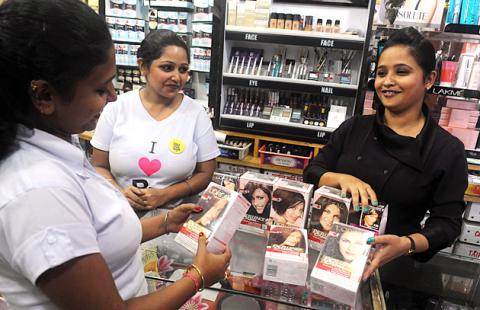Global cosmetic firms are turning to emerging markets in the hunt for sales, but they face a challenge tailoring their beauty products to suit new customers in India, China and elsewhere.
The London-based Euromonitor research group forecasts global growth worth US$64 billion within five years, including US$26 billion in the Asia-Pacific region and US$22 billion in Latin America.
“If you want to get a piece of the action, then you have to be present,” Euromonitor analyst Oru Mohiuddin told reporters. “We see that growth in emerging markets is enormous.”

Photo: AFP
L’Oreal, one of the world’s largest cosmetics makers, has set up research centers and factories in countries such as India, Mexico and Indonesia, and is adapting marketing and sales strategies to adapt to local consumer habits.
The French company estimates that by 2025 annual spending per head on beauty products will have grown in India from US$4 to US$13.
“Most groups continue to strengthen their regional and local structures [in emerging markets],” said Laurent Dusollier, an analyst in Paris for Roland Berger consultants. “Having established research and development centers, they have created specific products and marketing approaches, and strengthened their management teams.”
One of the key tests for firms trying to tap into new consumer tastes among India’s 1.2 billion population is to understand that most people shop in small neighborhood outlets rather than at supermarkets.
“There is a challenge of distribution and product availability, especially as there is no modern-style trading,” Dusollier said.
L’Oreal has experimented with selling products in cheap, individual sachets for a few rupees, and says 750,000 small shops now offer its goods nationwide.
The company has also used Garnier, which it owns, to develop a special range of products that use Indian ingredients and is testing makeup products to expand beyond hair and skincare sales.
“Our ambition is to become the No. 1 beauty company in [the] Asia-Pacific [region] and the No. 1 among emerging upper and middle class consumers,” L’Oreal’s regional managing director Jochen Zaumseil said.
“We expect strong growth in the next decade,” he said, adding the company wanted to make products “more accessible” and that it was considering mergers and acquisitions.
India’s economic growth has slowed sharply from nearly 10 percent four years ago to 5.5 percent in the latest quarterly figures — but Zaumseil says that L’Oreal grew by 25 percent last year in the country.
The company sees the high-end section of the market as the most attractive target, as it believes at least 60 percent of wealthy Indians currently buy luxury goods while traveling abroad.
The rapid emergence of sleek new shopping malls in cities like New Delhi, Mumbai and Bangalore points to a solid future for L’Oreal’s elite brands, including Lancome, Yves Saint Laurent and Kiehls.
“This is a long-term game and a very new market,” said Dinesh Dayal, chief operating officer for L’Oreal India.

Intel Corp chief executive officer Lip-Bu Tan (陳立武) is expected to meet with Taiwanese suppliers next month in conjunction with the opening of the Computex Taipei trade show, supply chain sources said on Monday. The visit, the first for Tan to Taiwan since assuming his new post last month, would be aimed at enhancing Intel’s ties with suppliers in Taiwan as he attempts to help turn around the struggling US chipmaker, the sources said. Tan is to hold a banquet to celebrate Intel’s 40-year presence in Taiwan before Computex opens on May 20 and invite dozens of Taiwanese suppliers to exchange views

Application-specific integrated circuit designer Faraday Technology Corp (智原) yesterday said that although revenue this quarter would decline 30 percent from last quarter, it retained its full-year forecast of revenue growth of 100 percent. The company attributed the quarterly drop to a slowdown in customers’ production of chips using Faraday’s advanced packaging technology. The company is still confident about its revenue growth this year, given its strong “design-win” — or the projects it won to help customers design their chips, Faraday president Steve Wang (王國雍) told an online earnings conference. “The design-win this year is better than we expected. We believe we will win

Chizuko Kimura has become the first female sushi chef in the world to win a Michelin star, fulfilling a promise she made to her dying husband to continue his legacy. The 54-year-old Japanese chef regained the Michelin star her late husband, Shunei Kimura, won three years ago for their Sushi Shunei restaurant in Paris. For Shunei Kimura, the star was a dream come true. However, the joy was short-lived. He died from cancer just three months later in June 2022. He was 65. The following year, the restaurant in the heart of Montmartre lost its star rating. Chizuko Kimura insisted that the new star is still down

While China’s leaders use their economic and political might to fight US President Donald Trump’s trade war “to the end,” its army of social media soldiers are embarking on a more humorous campaign online. Trump’s tariff blitz has seen Washington and Beijing impose eye-watering duties on imports from the other, fanning a standoff between the economic superpowers that has sparked global recession fears and sent markets into a tailspin. Trump says his policy is a response to years of being “ripped off” by other countries and aims to bring manufacturing to the US, forcing companies to employ US workers. However, China’s online warriors